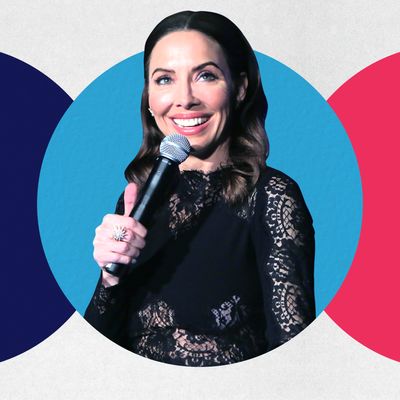
Maybe the most telling line of Whitney Cummings’s latest special, Can I Touch It?, arrives as she considers her body of work alongside the #MeToo and Time’s Up movements. While chastising a friend who broadly generalizes about “all men” and “all women,” Cummings stops herself: “I know it’s weird that I’m criticizing that, because generalizing about men and women did pay for my house.” Maybe it’s inevitable that the Whitney and Two Broke Girls creator would come to this conclusion, because it’s reflective of the soul-searching going on in stand-up. Still, Cummings’s self-reflexive fourth special marks a maturation in her comedy, and finds her in search of more nuanced ways of looking at old problems, while maintaining the level of joke writing she’s known for.
In this episode of Good One, Vulture’s podcast about jokes and the people who tell them, Cummings dissects her bit about an ostensible huddle with her girlfriends, in which they reconsider everyday behavior and diction in the midst of the #MeToo and Time’s Up moment. (She also talks sex robots, the Roseanne reboot, and why she has more fun onstage these days.) Read a short excerpt from the conversation or listen below. Download the episode from Apple Podcasts, Spotify, Stitcher, Overcast, or wherever you get your podcasts.
Good One
Subscribe on:
A comedian at your level has a lot of options. What made the subject of #MeToo or Time’s Up something you wanted to explore in your stand-up, opposed to, say, tweets or an episode of TV?
When the Harvey Weinstein news broke, so much stuff started flooding back about my early days in show business when I was taken advantage of and manipulated. We all have the instinct where if you tweet something topical you get likes, especially if it’s something defending women. But I didn’t feel comfortable tweeting very much about it. How do you reduce this to 140 characters? To come forward with a story that’s traumatic for you and then for someone to send a Parks and Rec gif is just like, Ugh.
I think the days of cheap laughs are over. Now is a time where if you’re gonna talk about something that is painful to people, you have to be mindful and measured. Instead of underserving it or capitalizing on the moment, I wanted to wait and do it with thought.
During these early stages, what is the biggest challenge of formulating a joke?
Writing premises. Jokes are the easy part. When you have a good premise, the joke writes itself. Some of us, especially Hollywood people, are like, “Oh, the average person is an idiot.” It’s just not true. People in the comments section of my Instagram always write funnier captions than me. I play to the top of my intelligence and assume the audiences are smarter and funnier than I am, and I end up writing better stuff.
How did you decide to approach the material in the way you did? Talking about #MeToo and Time’s Up can be fraught, especially if you’re seen to be critical of the movement in any way.
I talk about whatever I’m feeling, whether it’s right or not, but I’m not asking you to have the same feelings as me. We’re in this new moment where if you disagree with someone, you’ve wronged them. It’s like, “No, we’re allowed to have different opinions. I don’t owe you an apology just because we disagree.” This could make me — in Roxane Gay’s words — a “bad feminist,” but I found a lot of my girlfriends would be like, “Don’t objectify us,” and then the next photo was them, like, topless. I was like, That’s not wrong; good for you. Maybe I’m jealous. You have ten times as many followers as I do. It took me a minute to regroup and go, Wait, this is confusing to me, even as a woman who knows women should be able to be sexual and not objectified, and should be able to be naked and not be in danger. Our brains want to put things in boxes, and this joke was very much about that, and also this idea of, Okay, it’s game time. It’s time to level up.
You do call yourself out for previous work that generalizes about the differences between men and women. How and why did you move past that?
The simple answer is, I grew up. Stand-up was all fun and games with “men and women are different,” until this thing happened and men and women started being at war with each other in a way that was not nuanced or helpful. That’s when I wanted to get in the weeds and go, “This isn’t all men versus all women; this is the bad men and women versus the good men and women.” It was very weird that I, of all people, became the person that was like, “This isn’t about men versus women,” even though that’s my brand. It felt necessary to delineate that.
Despite the subject, it seems like you’re having more fun performing than you have in the past. Are you having more fun?
Yeah, definitely. I’m a serious person, and I never thought I was allowed to be playful onstage. I don’t know if I was trying to neuter myself; I was just trying to be good. I started writing toward the things that really make me laugh instead of, I know I can write a good joke about this and it kills. Now it’s like, I can write a good joke about it, it kills, but I’m not having fun with it. Maybe it’s because it’s my fourth special and I’ve done it enough and weed is legal in California now — that’s helpful.





